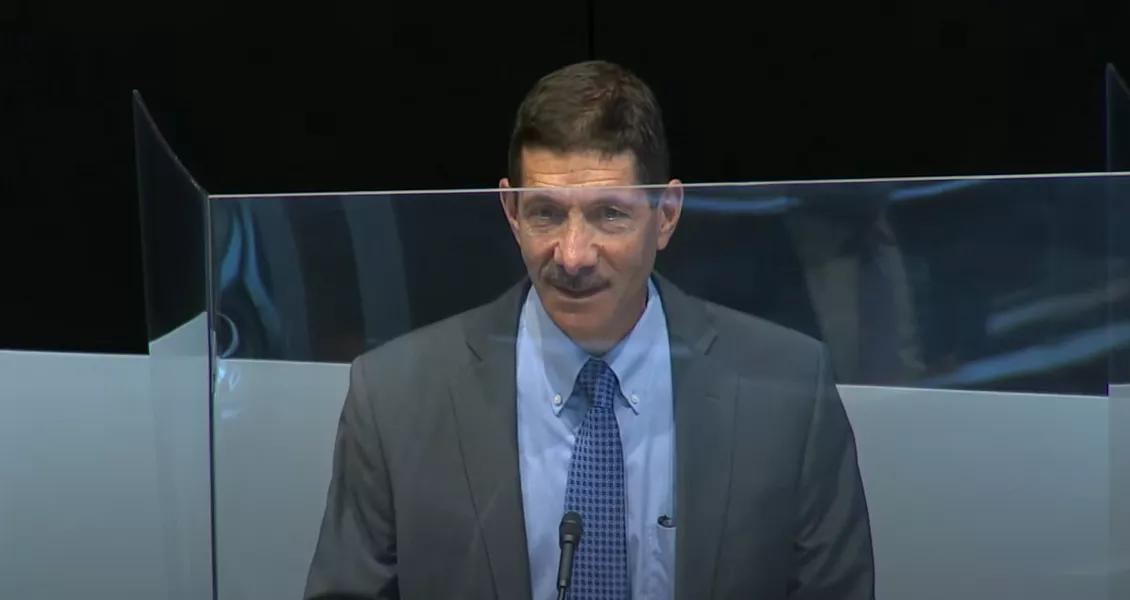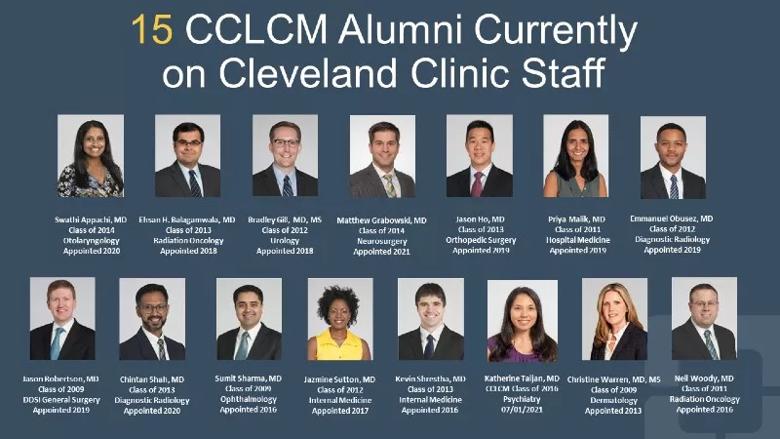Bud Isaacson, MD, Professor of Medicine and Executive Dean of CCLCM, opened the 2021 State of the College address by expressing his gratitude to the faculty, staff and students for their collective efforts to create the best medical school experience possible, especially in light of the ongoing COVID-19 pandemic. “We’ve done a remarkable job as a team,” he said.
Dr. Isaacson recapped milestone events of 2021, noting the challenges faced by the graduating class in particular. For example, the Class of 2021 was the first group to experience virtual residency interviews and not have the benefit of in-person residency visits. Still, they experienced excellent Match results. To everyone’s delight, commencement was held in person, outside on a sunny day and with appropriate physical distancing.
Eighty-three CCLCM alumni, or about 20%, have trained or are currently training at Cleveland Clinic. Fifteen CCLCM alumni currently serve as Cleveland Clinic staff including Christine Warren, MD, MS, Associate Professor of Dermatology and Associate Dean of Admissions and Student Affairs.
CCLCM is beginning to track the accomplishments of its alumni. Because the power of N is small (just 32 students in each class), we are looking at a 10-year follow up. Data from the first two graduating classes — 2009 and 2010 — indicate that most alumni have landed in fellowships, are involved in research and are producing first-author publications. This infographic sums up those findings.
Several initiatives are underway to help make CCLCM among the best medical programs:
- Communication: Our regular e-newsletter, called InSight, keeps faculty, staff, students, donors and friends up to date with CCLCM news. Weekly virtual town halls, which began during the early days of the pandemic, are open to everyone. Students have regular class meetings, town halls and their own newsletter to keep them informed and to give them a forum to discuss issues that matter to them. Students in years 1, 3 and 5 have structured individual student meetings to ensure they’re on track with their goals, and all students are welcome to meet with the deans whenever they wish.
- Faculty development: CCLCM has expanded its faculty development offerings to help support the 900 faculty who teach third-year students during their clerkship year. With the help of Neil Mehta, MBBS, MS, Professor of Medicine and Associate Dean for Curriculum, and Craig Nielsen, MD, Associate Professor of Medicine and Assistant Dean for Clinical Education, we launched the Cleveland Clinic Longitudinal Clerkship Faculty Development Series, which offers virtual sessions on topics such as creating an effective learning environment, addressing unintentional mistreatment and advancing health equity.
- Attention to climate change: CCLCM is looking closely at the intersection of climate change and health from many lenses. Ilyssa Gordon, MD, Associate Professor of Pathology and Medical Director of Sustainability, and James Sullivan (‘24) presented a brief update about how the team has successfully integrated climate content into existing curricular activities as well as in pre-clerkship and clerkship years. For details, read “Training physician investigators who are climate-aware.”
- Medical education during the pandemic: Dr. Neil Mehta presented on the challenges of balancing student clinical experience with student safety in light of the COVID-19 pandemic. When students were pulled from their clinical experience early in the pandemic out of safety concerns, they jumped in to take on several COVID-related projects involving research, physician training, virtual clinical care and technology. For details, read “Students rise to the challenge of COVID-19.” Dr. Mehta noted that the students gained much from these experiences, including making the human connections that they were missing because of physical distancing, and that physicians from across Cleveland Clinic said that they found our students to be a valuable addition to the clinical areas.
- Diversity, equity and inclusion: Monica Yepes-Rios, MD, Associate Professor of Medicine and Director of Diversity and Inclusion, shared the many reasons why diversity, equity and inclusion (DEI) is so important in healthcare including that Black, Hispanic and American Indian/Alaskan Natives are greatly underrepresented in medicine. Last year, CCLCM established a Diversity, Inclusion and Anti-Racism Steering Committee along with several action groups, in which more than 100 people volunteered to get involved. Among the many achievements thus far is the establishment of a scholarship for students from backgrounds underrepresented in medicine so that they can spend time learning firsthand what it is like to be a resident at Cleveland Clinic.
Jason Lambrese, MD, Assistant Professor of Medicine and CWRU Assistant Dean of Student Affairs, and Gustavo Roversi (‘24) offered a deep dive into one of the DEI action groups, presenting on the Curriculum Review LBGTQ+ Action Group’s needs assessment. The goal of the group is to improve and increase the amount of LGBTQ+ health teaching across the five-year curriculum. Dr. Lambrese noted that the more familiarity students have with LGBTQ+ issues, the more empathy they will have toward this population.
Dr. Christine Warren introduced the Class of 2026 and shared some fun facts about them. CCLCM received 2,099 applications — the most ever — for this incoming class of 32 spots.
Dr. Warren acknowledged Darlene Gray, a CCLCM colleague who passed away unexpectedly in April. She encouraged contributions to the Darlene Gray Student Life Emergency Fund, which is designed to provide emergency financial support for our students, in memory of Darlene.
Dr. Isaacson recognized the flexibility of course directors and curricular leads who have embraced changes to the curriculum for the betterment of the program. “We’ve worked very hard in a collaborative way and are making small changes, meaningful changes, without disrupting an existing curriculum that’s working very well,” he said.
He then closed the address by acknowledging that CCLCM looks much different from the medical school he attended. “I think I want to go to med school again,” he said with a smile.
View the entire State of the College address.

